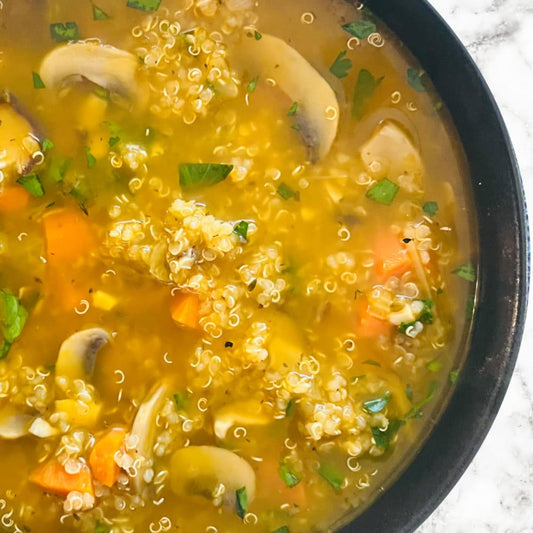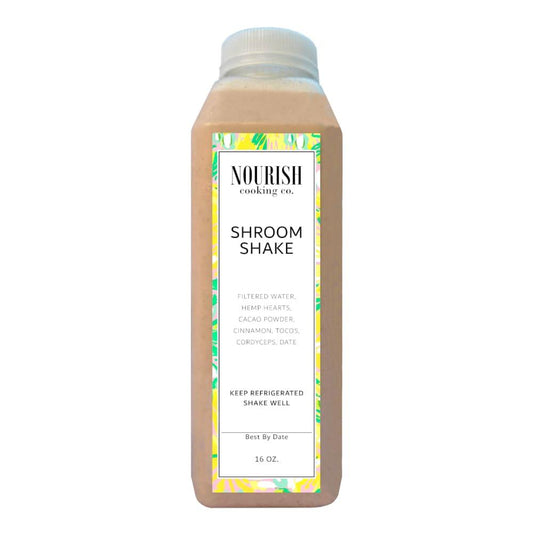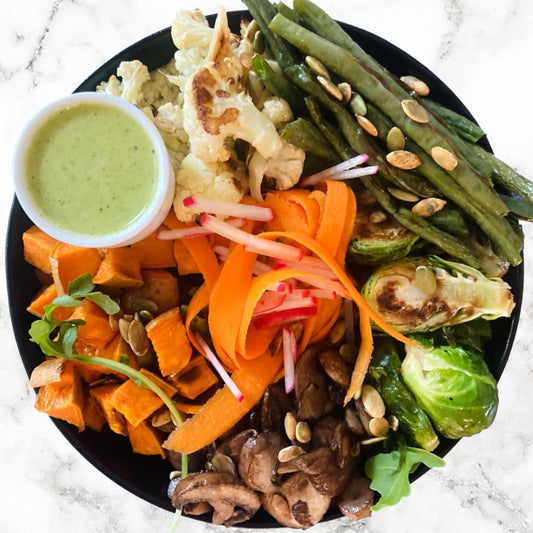Vegetable, fruit, or fungi? That’s the big question when it comes to mushrooms. Well, vegetables and fruit can be crossed off the list since, scientifically, mushrooms aren’t technically plants, leaving fungi as the only other option. Even though mushrooms are fungi, they’re still commonly classified as vegetables.
But what’s the difference between a fungus and a vegetable anyway?
Well, for something to be a vegetable, it must have roots, seeds, and leaves. Fungi, on the other hand, have none of those things. Fungi don’t even need light to grow. Yet, there are still some major similarities between fungi and vegetables, such as their cell structure and DNA makeup.

Throughout human history, mushrooms were believed to be supernatural in origin thanks to their hallucinogenic properties. The ancient Romans and Egyptians believed that mushrooms came from the gods and were natural signs of immortality.
However, the fungi, namely shiitake mushrooms, were first cultivated in China and Japan in the 600s mainly for medicinal purposes. Other species of mushrooms, such as the enoki take, were more commonly consumed as food.
By the 1600s, mushrooms had spread to Europe and had become a staple in French cuisine in particular. It was in France that the Agaricus bisporus, or button mushroom—the most commonly consumed mushroom today—was first cultivated.

Well, for something to be a vegetable, it must have roots, seeds, and leaves. Fungi on the other hand have none of those things. Fungi don’t even need light to grow. Yet, there are still some major similarities between fungi and vegetables, such as their cell structure and DNA makeup.
Throughout human history, mushrooms were believed to be supernatural in origin thanks to their hallucinogenic properties. Ancient Romans and Egyptians believed that mushrooms came from the gods and were natural signs of immortality.
Mushroom cultivation wasn’t popular in the US until the late 1800s, but since then, mushrooms have become one of the most popular ‘vegetables’ among Americans and throughout the world.
Filled with essential vitamins and minerals, mushrooms are one of the healthiest foods you can eat. They’re high in protein and fiber and low in calories. They also contain high amounts of selenium, copper, and magnesium, making them ideal for regulating and strengthening body processes.
Mushrooms contain high amounts of antioxidants that combat aging and promote health. Mushrooms have high amounts of ergothioneine and glutathione, both antioxidants. Different species of mushrooms contain different amounts of these two antioxidants. He explained that mushrooms are the richest source of these two antioxidants, and some are really rich in them.

The Top Health Benefits of Mushrooms
Mushrooms help prevent dementia
Mental decline, such as dementia and Alzheimer’s disease, is one of the most devastating conditions a person can experience. Mental decline is also on the rise, with about 1 in 9 adults affected by it. Yet, there are certain things you can do to both treat and prevent mental decline, and eating mushrooms is one of them!
Mushrooms are a great source of a mineral called selenium. Selenium is critical to cell production and maintenance, thyroid health, immune system health, and protection against certain cancers. Selenium deficiency is a serious problem that can lead to fatigue, hair loss, infertility, and, of course, mental decline.
All mushrooms contain a significant serving of selenium, but shiitake, cremini, and portabella mushrooms have the largest selenium content.

Mushrooms improve bone health
Those suffering with brittle bones or osteoporosis may benefit from slight changes in their diet. An increased intake of vitamin D is necessary for both strong bones and muscles. In fact, a vitamin D deficiency can lead to the development of bowed legs, a stooped posture, and overall bone weakness.
It does this by facilitating and regulating the body’s absorption of calcium and phosphorus—two minerals your bones can’t survive without. Besides that, vitamin D helps the immune system function normally and improves resistance to certain diseases.

As mushrooms grow, whether under natural or UV lamp light, they absorb a major amount of vitamin D. One cup of cremini mushrooms contains about 139% of the daily requirement for vitamin D. Even after mushrooms have been harvested, just leaving them out in the sun for a few hours can significantly increase their vitamin D concentration!
Mushrooms may improve your mood
High levels of sodium are linked to feelings of stress, anxiety, and depression. So, those with diets made up of salty or fast foods not only experience problems with their physical health, but problems with their mental health, too.
To counter the negative effects of high sodium levels in the body, you can increase potassium intake. Potassium reduces sodium levels by flushing sodium out through urine, improving your mood and overall mental health.

Increased potassium intake is also crucial for managing healthy blood pressure. It’s one mineral you definitely don’t want to be without. Luckily, just one cup of cooked white button mushrooms contains 12% of the daily potassium requirement.
Popular varieties of Mushrooms
Let's explore some of the most popular varieties of mushrooms and their unique characteristics:
1. Button Mushrooms: Flavorful and Nutritious
Button mushrooms, also known as baby mushrooms or white mushrooms, are the most common type you'll find in grocery stores and are not only delicious but also packed with essential nutrients. Here’s why you should include them in your diet:

Low-Calorie Goodness: One cup of raw button mushrooms (about 70 grams) provides just 15 calories. Despite their low caloric content, they offer a surprising amount of nutrients.
Protein and Fiber: Button mushrooms contain 2.2 grams of protein and nearly 1 gram of fiber per cup. Their fiber content supports digestive health.
Vitamins and Minerals:
- Copper: Essential for energy production and maintaining heart health.
- Potassium: Helps regulate fluid balance and supports nerve function.
- Iron: Crucial for hemoglobin synthesis and overall vitality.
- B vitamins (riboflavin, niacin, and pantothenic acid): Assist in metabolic reactions and energy production.
Heart-Healthy: With minimal fat (mostly heart-healthy polyunsaturated fat), button mushrooms are a smart choice. Their low sodium content further contributes to heart health.
Micronutrients:
- Selenium: An antioxidant that protects cells from damage.
- Vitamin D: Present in the form of ergocalciferol, which is important for bone health.
- Biotin (Vitamin B7): Supports various metabolic processes
Glycemic Index: Button mushrooms have a naturally low glycemic index, making them gentle on blood glucose levels. While more research is needed, they may be beneficial for managing diabetes.
2. Cremini Mushrooms: Packed with vitamins and nutrients
Cremini mushrooms (also spelled cremini or baby bellas) are some of the most common mushrooms found in grocery stores. They belong to the same species as common white mushrooms and portobello mushrooms—Agaricus bisporus. The key difference lies in their age at harvest: portobellos mature the longest, while cremini and white mushrooms are harvested when they are younger. Some brands even market cremini mushrooms as “baby bellas,” emphasizing their similarity to portobellos.

Here’s why you should embrace these little powerhouses:
-
Complex Flavor Profile:
- Cremini mushrooms are older than white mushrooms and darker in color.
- Their age contributes to a more complex flavor compared to white mushrooms.
- While not as deep or rich as fully grown portobellos, creminis offer a delightful taste.
-
Health Benefits:
- Although cremini mushrooms provide small amounts of vitamins and minerals, their true health benefits come from other factors.
- Boosted Immune System: Like many mushrooms, creminis contain helpful bacteria that support the microbiome in your digestive tract. These beneficial bacteria enhance digestion and boost immune responses.
- Cancer Prevention: Creminis contain aromatase inhibitors, which block an enzyme promoting estrogen production. This effect may protect against breast and lung cancers.
- Blood Pressure Control: Including mushrooms in your diet can reduce the risk of high blood pressure during pregnancy. Eating 100 grams of mushrooms daily, including creminis, may help pregnant women maintain healthy blood pressure.
- Reduced Salt Intake: Cremini mushrooms’ strong, savory flavor reduces the need for excessive salt in dishes.
-
Nutrition Facts (Per Serving of 10 Cremini Mushrooms):
- Calories: 44
- Protein: 5 grams
- Fat: 0 grams
- Carbohydrates: 9 grams
- Fiber: 1 gram
- Sugar: 3 grams
-
Vitamins and Minerals:
- Creminis contain vitamin B2 (riboflavin), vitamin B3 (niacin), pantothenic acid, potassium, copper, and selenium.
- Their antioxidants help reduce oxidative stress in your body.
Incorporate cremini mushrooms into your meals—sauté them with garlic, toss them in pasta, sprinkle them on green beans, fold them into omelets, or roast them with veggies. These little fungi pack a big punch!
3. Portobello Mushrooms: Healthy and versatile
Portobellos are the final full-grown stage of the button mushroom's life. They are much larger than cremini or button mushrooms and have a more meaty texture. Portobellos retain a mild flavor and are often used as a meat substitute in vegetarian dishes. Their cap fully opens, exposing the dark gills underneath1.

Portobello mushrooms are a favorite among mushroom enthusiasts for their robust flavor and versatility. Here’s why you should consider adding them to your plate:
-
Low in Calories, High in Nutrients:
- A medium-sized portobello mushroom cap contains only 18 calories.
- Despite their low caloric content, they pack a punch in terms of nutrients.
-
Rich in Essential Minerals:
- Copper: Vital for maintaining healthy bones and nerves.
- Selenium: A powerful antioxidant that supports immune function.
- Potassium: Helps regulate blood pressure and fluid balance.
-
Protein and Fiber:
- Portobellos provide 2 grams of protein per serving.
- Their 1 gram of dietary fiber supports digestive health.
-
Antioxidant Properties:
- Portobello mushrooms contain non-nutritive compounds like polyphenols and carotenoids.
- These antioxidants have anti-inflammatory and anti-cancer properties.
-
Vitamin D Boost (with a Twist):
- Mushrooms are the only known non-animal source of vitamin D.
- While most commercial mushrooms are grown indoors and lack significant vitamin D, some growers expose portobellos to ultraviolet (UV) light to enhance their vitamin D content.
-
Meaty Texture, Umami Flavor:
- Portobello mushrooms taste meaty and savory, with an umami quality.
- Use them as a satisfying substitute for higher-calorie foods like meat and cheese.
-
Versatile Cooking Options:
- Grill portobello mushrooms and use them as burger buns or even as the burger itself.
- Marinate them in vinegar and herbs, then grill or pan-fry.
- Slice portobellos into strips and add them to stir-fries or salads.
Portobello mushrooms are not only delicious but also offer a host of health benefits. Whether you’re a vegetarian, vegan, or simply a food enthusiast, these fungi deserve a prominent place in your culinary repertoire!
4. Oyster Mushrooms: A delicious fungi rich in nutrients
Oyster mushrooms have a delicate, slightly seafood-like flavor. They come in various colors, including gray, yellow, and pink. Great for stir-fries, soups, and sautés.

Oyster mushrooms, also known as Pleurotus species, belong to a group of gilled mushrooms. While technically different from plants (as they are fungi), oyster mushrooms are a fantastic addition to any meat-free diet. Here’s why you should embrace these flavorful fungi:
-
Rich in Nutrients:
- Oyster mushrooms are loaded with fiber, vitamins, minerals, and other important nutrients.
- They’re particularly low in carbohydrates, making them suitable for those following low-carb dietary patterns.
- Nutritional content per 1 cup (86 grams) of raw P. ostreatus oyster mushrooms:
- Calories: 28
- Carbs: 5 grams
- Protein: 3 grams
- Fat: <1 gram
- Fiber: 2 grams
- Key vitamins and minerals: niacin, pantothenic acid (vitamin B5), folate, choline, potassium, iron, phosphorus, and zinc.
- Smaller amounts of vitamin D and selenium are also present.
-
Antioxidant Power:
- Oyster mushrooms provide antioxidants, which combat cellular damage in your body.
- Phenolic compounds like gallic acid, chlorogenic acid, and naringenin act as antioxidants.
- The amino acid ergothioneine found in oyster mushrooms has powerful antioxidant effects.
- Studies in rodents suggest that oyster mushroom extract improves antioxidant levels and reduces inflammatory markers.
- Test-tube studies show that gray oyster mushroom extract inhibits oxidative damage to human artery cells and prevents LDL (bad) cholesterol oxidation—a process linked to heart disease.
-
Potential Health Benefits:
- Cancer Prevention: Oyster mushrooms contain compounds that may protect against cancer.
- Heart Health: Their antioxidant properties and impact on cholesterol levels contribute to cardiovascular well-being.
- Immune Support: Beneficial bacteria in oyster mushrooms support gut health and immunity.
-
Versatile Culinary Uses:
- Try oyster mushrooms in dishes like:
- Mushroom chowder
- Oyster mushroom tempura
- Stir-fried oyster mushrooms with tofu, minced ginger, and garlic
- Try oyster mushrooms in dishes like:
5. Cordyceps Mushrooms: A Natural Boost for Vitality and Heart Health
Long revered as a tonic for overall well-being, cordyceps mushrooms offer a wealth of health benefits. These remarkable fungi contain essential amino acids, beneficial fatty acids, and vital minerals, making them a powerful ally for promoting energy and endurance.

Heart Health and Chronic Kidney Disease:
- Recent research demonstrates that cordyceps can significantly reduce heart injuries in rats with chronic kidney disease. These injuries are known to elevate the risk of heart failure, making cordyceps a potential preventive measure1.
- By minimizing these kidney-related injuries, cordyceps may help safeguard against heart-related complications.
Cholesterol Management:
- Cordyceps have a positive impact on cholesterol levels. Studies reveal that they effectively decrease LDL (low-density lipoprotein) cholesterol, which is notorious for contributing to arterial plaque buildup and heart disease risk2.
- Including cordyceps in your diet may help maintain healthy cholesterol levels.
Triglyceride Reduction:
- High triglyceride levels are associated with an increased risk of heart disease. Cordyceps have been shown to lower triglycerides in mice, potentially benefiting cardiovascular health.
Incorporating cordyceps mushrooms into your daily routine can be a natural way to enhance vitality, support heart health, and boost overall wellness. Consider exploring cordyceps supplements or incorporating them into your favorite recipes!
6. Shitake Mushrooms: A wholistic approach to wellness
Shiitake mushrooms, revered for centuries in traditional medicine, have now caught the attention of modern science. Shiitake mushrooms, revered for centuries in traditional medicine, have now caught the attention of modern science. Mushrooms have the potential to increase the nutritional quality of plant-based eaters, as well as promote heart health, lower the risk of prostate cancer, offer relief from gingivitis, and stimulate the immune system. Additionally, shiitake mushrooms have been utilized as a natural therapy in alternative medicine for a considerable amount of time. In a similar vein, contemporary medical research indicates the intriguing health benefits of shiitake mushrooms.

These fungi offer a wide range of health benefits, including:
-
Heart Health and Cholesterol Management:
- Shiitake mushrooms contain eritadenine, a compound known to reduce cholesterol levels.
- By inhibiting cholesterol synthesis, shiitake mushrooms contribute to heart health.
- Regular consumption may help maintain healthy blood vessels and reduce the risk of cardiovascular diseases.
-
Immune System Boost:
- The beta-glucans in shiitake mushrooms enhance immune responses.
- These compounds activate immune cells, improve defense mechanisms, and protect against infections.
- Shiitake mushrooms are a natural way to fortify your immune system.
-
Anticancer Properties:
- Research suggests that shiitake mushrooms may help reduce the risk of prostate cancer.
- Active compounds in shiitakes inhibit cancer cell growth and promote apoptosis (cell death).
-
Gingivitis Relief:
- Shiitake mushrooms contain lentinan, which has anti-inflammatory effects.
- Lentinan may help manage gingivitis by reducing gum inflammation.
-
Nutritional Powerhouse:
- Shiitake mushrooms are low in calories but high in nutrients.
- They provide essential vitamins (including vitamin D), minerals (such as copper and selenium), and amino acids.
- Incorporating shiitakes into a plant-based diet enhances overall nutritional status.
-
Holistic Tradition Meets Modern Medicine:
- Shiitake mushrooms have been used as a natural remedy for centuries.
- Modern research validates their potential health benefits.
- From immune support to cancer prevention, shiitakes offer a holistic approach to wellness.
7. Lion's Mane Mushrooms: A wholistic approach to wellness
An extensive history may be traced back to the lion's mane mushroom, which is also referred to as the hedgehog mushroom or by its scientific name, Hericium erinaceus. The fungus, (Hericium erinaceus), also known as "yamabushitake,” which was affectionately referred to as the "monkey head" mushroom, was utilized to increase overall health and longevity. It was a cornerstone of traditional Chinese medicine that dates back hundreds of years.
In the meantime, this mushroom was also known as the "mountain monk" mushroom in Japan. Buddhist monks used the powder of this fungus to enhance their ability to focus while they were meditating. There is additional evidence that dates back to ancient Greece, where lion's mane was used for its anti-inflammatory and wound-healing abilities.
This evidence dates back to the year 450 B.C. The harvesting of this fungus has traditionally been accomplished through wild foraging; however, the cultivation of lion's mane began in China in 1988, and ever since then, its popularity has progressively increased.

Here are the remarkable health benefits and nutritional value of lion’s mane mushrooms:
-
Brain Health and Cognitive Function:
- Lion’s Mane contains unique compounds—hericenones and erinacines—that stimulate the growth of brain cells.
- According to research, these substances may shield against Alzheimer's disease by preventing amyloid-beta plaques from damaging neuronal tissue.
- A study involving people with mild Alzheimer’s disease found that daily supplementation with lion’s mane significantly improved cognitive test scores.
-
Anxiety and Depression Relief:
- Chronic inflammation is linked to anxiety and depression.
- Lion’s Mane mushroom extract has anti-inflammatory effects, reducing symptoms of anxiety and depression in animal studies.
- Improved hippocampus functioning (the brain region responsible for memory and emotions) may explain these positive effects.
-
Nerve Regeneration and Recovery:
- Lion’s Mane supports nervous system health.
- It may aid in nerve cell regeneration and recovery from nervous system injuries.
- This makes it valuable for overall neurological well-being.
-
Gut Health and Immunity:
- Lion’s Mane mushrooms have a positive impact on gut health.
- A healthy gut contributes to a robust immune system.
- The bioactive compounds in lion’s mane enhance immune responses.
-
Nutritional Profile:
- Lion’s Mane is low in calories yet high in fiber.
- It contains essential amino acids, making it a valuable protein source for vegetarians and vegans.
- Rich in vitamins B, C, and D, as well as minerals like potassium, zinc, iron, and selenium.
-
Culinary Uses:
- Enjoy lion’s mane mushrooms sautéed, grilled, or added to soups and stews.
- Their seafood-like flavor pairs well with various dishes.
There are many more mushroom varieties out there, each with its own unique taste and culinary uses.

Buying Mushrooms: What to Look For
Depending on what market you go to, you may find a very small or large variety of mushrooms to choose from. So, it’s important that you have a good idea of what flavor profile you’re looking for and what type of mushroom would work best for you.
Let’s go over some of the most common types of mushrooms:
The most widely consumed mushroom is the button mushroom. These round, white mushrooms are often the cheapest mushrooms, too. They have a mild taste that makes them great when eaten raw in salads. When cooked, they develop a richer flavor that lends itself well to most recipes.
Cremini mushrooms are very similar to button mushrooms—they’re the same variety, just at different stages of growth! Since cremini mushrooms take longer to grow than button mushrooms do, their flavor profile is a bit more complex and savory.
The oldest stage of button and cremini mushrooms are portobello mushrooms. These larger mushrooms have an extremely savory flavor that makes them an ideal meat substitute. Shiitake and king oyster mushrooms have a similar meaty, savory flavor.
No matter what variety of mushroom you buy, choose mushrooms that have minimal bruising and that don’t feel wet or slimy to the touch.
Once you’ve picked out your mushrooms, storing them is easy. Just keep them in their original packaging, or in a paper bag, in the fridge. They should stay fresh for up to one week.
With almost all mushrooms, both the stems and caps are edible. Button, porcini, cremini, portabella, chanterelle, and chestnut mushrooms all have delicious stems that work well in countless recipes. However, the stems are tougher and woodier than the cap, making them less desirable in some cases. It’s up to you to decide whether you want to cook with them or without.

Before cutting and cooking, note that mushrooms are rarely washed before being delivered to a market or grocery store, so make sure to thoroughly rinse them off under running water. Pat them dry with a paper towel or rag.
There are hundreds of amazing recipes that will put a spotlight on your mushrooms. Soups, pastas, pizzas, omelets, and stews make for perfect mushroom meal opportunities. Mushrooms even go well in burgers and ramen, too! However, mushrooms really stand out inside dishes. Sauteed, grilled, stuffed, or roasted, mushrooms make a great addition to breakfast and meat dishes.

Whether you choose to eat mushrooms as a pizza topping or in a salad, it’s the way you cook them that determines how nutritious they really are. Boiling or frying mushrooms can diminish their nutritional value, while grilling them increases their protein and antioxidant content. Another healthy way to consume mushrooms is to simply eat them raw!
Different ways to eat and enjoy Mushrooms
Frequently Asked Questions (FAQs) about Mushroom Benefits
What Are Mushrooms?
Mushrooms are fungi, distinct from plants and animals. They come in various shapes, sizes, and colors. Widely used in cooking, they add a savory flavor to dishes.
What Is the History of Edible Mushrooms?
Mushrooms have been eaten and used as medicine for thousands of years. Ancient Egyptians and Vikings consumed hallucinogenic fly agaric mushrooms during religious ceremonies. Voltaire attributed the War of Austrian Succession to mushroom poisoning.
What Are the Common Mushroom Varieties?
-
- Button Mushrooms: Popular and versatile.
- Cremini Mushrooms: Brown variation of button mushrooms.
- Portobello Mushrooms: Large, meaty texture.
- Shiitake Mushrooms: Woodsy flavor, used in Asian cuisine.
- Chanterelle Mushrooms: Nutty and fruity taste.
- Morel Mushrooms: Honeycomb appearance, prized by chefs.
- Truffles: Earthy, aromatic, and expensive.
What are the health benefits of mushrooms?
Mushrooms offer a variety of health benefits due to their rich nutrient content and antioxidant properties. They are considered a good source of selenium and potassium, which can contribute to heart health. Additionally, some medicinal mushrooms like shiitake are known to stimulate the growth of red blood cells and support overall health.
What are the different types of mushrooms and their benefits?
There are various types of mushrooms, such as button mushroom, oyster mushroom, and shiitake mushroom, each with unique health benefits. For example, button mushrooms are known for their potential to lower the risk of developing type 2 diabetes, while shiitake mushrooms are a good source of ergothioneine, which is beneficial for overall health.
How do mushrooms contribute to heart disease prevention?
Mushrooms may help prevent heart disease due to their nutritional value and low calories content. They are also low in fat and cholesterol, making them a heart-healthy option for diet. Additionally, the antioxidants found in mushrooms can contribute to lowering the risk of heart-related conditions.
What nutrients do mushrooms contain?
Mushrooms deliver very high nutritional value. Mushrooms contain essential nutrients such as vitamins B, which are vital for energy production and immune function. They also provide a good source of vitamin D, especially when exposed to uv light, contributing to overall health
- One cup of raw mushrooms (70g) provides:
- Calories: 15
- Protein: 2.2g
- Carbohydrates: 2.3g
- Fat: 0.2g
- Fiber: 0.7g
- Vitamins (B3, B5) and minerals (copper, potassium, iron).
How Can I Cook with Different Mushroom Varieties?
- Sauté, grill, or add to soups and stews.
- Explore recipes that highlight their unique flavors.
Try these nutritious, delicious, fresh vegan meals and food incorporating mushrooms available to order from NOURISH:
*ORGANIC* Mushroom Quinoa Soup
*ORGANIC* "Shroom" Hemp Hearts Shake w Cordyceps Mushroom








